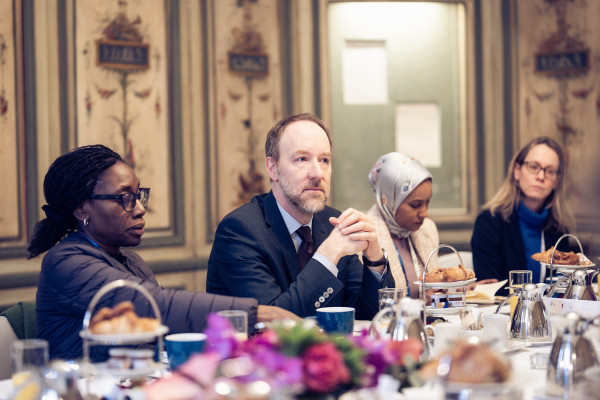ZIF's contribution to the Munich Security Conference 2025
 Quelle: MSC
Quelle: MSC
ZIF was represented and involved in various formats and moderations at this year's highly acclaimed Munich Security Conference (MSC). Together with its Swedish partner, the Stockholm International Peace Research Institute (SIPRI), ZIF invited selected experts to a side event on 16 February 2025 entitled ‘Bypassing Geopolitical Blockages: How to Regionalise Crisis Management’. ZIF Executive Director Dr Astrid Irrgang also moderated a ‘Spotlight’ session on the dramatic humanitarian situation in Haiti. Analyst Tobias Pietz discussed the current situation and escalating conflict in the Democratic Republic of Congo in a public panel organised by Deutsche Welle. And last but not least, the recently published study ‘5 Trends for Peace Operations’ was included in the MSC report.
Strong contributions to international crisis management
For the third year in a row, ZIF has provided strong contributions and food for thought to the Munich Security Conference and contributed expertise in the field of international crisis management.
On the opening day, Deutsche Welle organised a public panel discussion on the situation and prospects in the DR Congo (DRC), including ZIF analyst Tobias Pietz. The DR Congo has hosted one of the largest and longest-serving UN peacekeeping missions, MONUSCO. The fall of Goma to the Rwandan-backed M23 militia raised questions about the role of conflict resources and the position and commitment of the EU. There were calls for regional organisations to play a key role there, especially when it comes to an immediate ceasefire. So far, however, neither the joint summit of SADC and EAC nor the AU summit in February have been able to make a substantial contribution to this.
On Saturday, ZIF Director Dr Astrid Irrgang moderated a spotlight on the situation in Haiti in the main programme of the MSC. The panellists emphasised the dramatic humanitarian situation and the potential destabilising effects on the region. The United Nations has been present in Haiti almost continuously for 30 years - there is an urgent need for a strong political role and a stronger focus on addressing the root causes of instability. However, given the current geopolitical situation, both seem difficult to achieve.
Focus on regionalisation
On Sunday, ZIF and its long-standing partner SIPRI jointly organised the MSC side event on the topic of ‘Bypassing Geopolitical Blockages: How to Regionalise Crisis Management’. A topic that fitted in very well with the conference's orientation and focus and completed the range of topics on offer. The high-level panel included Bettina Cadenbach, Ambassador of the Federal Republic of Germany to the Federative Republic of Brazil, Seif Kandeel, Director General, Cairo International Center for Conflict Resolution, Peacekeeping and Peacebuilding (CCCPA) as well as Delphine Pronk, Chair of the Political and Security Committee of the European Union.
‘The side event also stands for our increased cooperation with regional organisations and global partners over the last ten years. Flagship events such as the International Challenges Forum, our training courses or our almost 180 seconded staff who work in UN, EU, OSCE, OAS or NATO missions and also in EU delegations worldwide: ZIF has truly become a multilateral player,’ emphasises ZIF Executive Director Astrid Irrgang.
Tobias Pietz concludes on the response to the security conference: ‘Some of the contributions to this year's MSC were understood as fundamental paradigm shifts. But instead of indignation, I hope for a new momentum for a strong, united, democratic, and autonomous Europe on the world stage. The MSC revitalized the search for new global partnerships to make up for a struggling transatlantic relationship - including new coalitions on (indeed) burning issues like climate change and biodiversity loss. And for more regional solutions for peace and security.’
In his farewell speech, the outgoing MSC Chairman, Ambassador Christoph Heusgen, described this as the ‘now or never’ moment for Europe, too. In his three years in office, he opened up the Munich Security Conference to the world - not only through more side events and ‘spotlight’ sessions on global topics, but also through the participation of over 30% of attendees from the so-called ‘Global South’. This legacy can help to navigate the increasing ‘multipolarisation’, as this year's MSC report highlights.
In view of the current global challenges, ZIF remains determined to further expand its multilateral partnerships and promote innovative approaches to crisis management. Our goal is to work with regional and international actors to develop sustainable solutions for peace and security - today and in the future.
ZIF Study